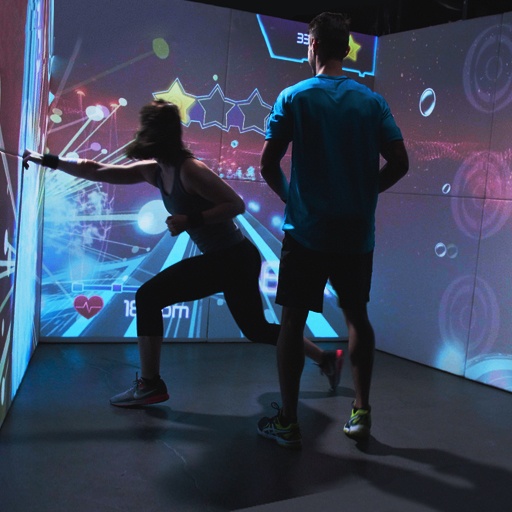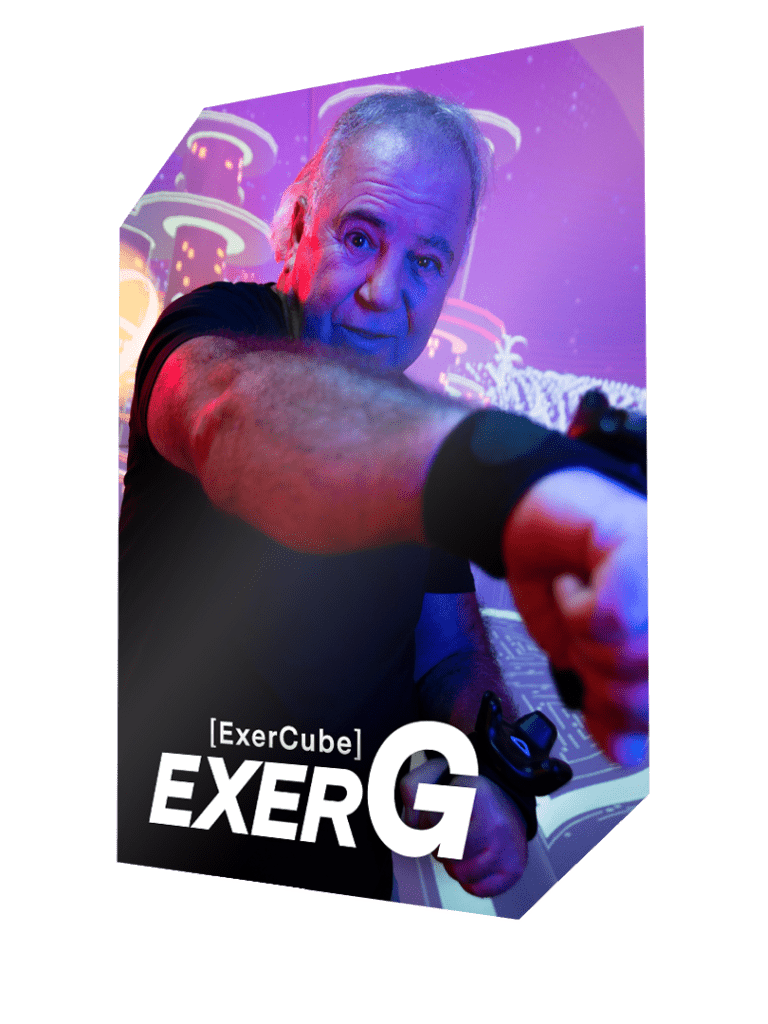Exercise in Dual Flow
Improvements for body and mind
The training programmes are controlled with holistic functional training movements. Functional training is known for its overall training effects to increase endurance, strength, and flexibility. It stands for the use of multiple muscle and joint activities, the combination of upper and lower body movements, and the multi-use of the body in each movement.
The additional cognitive challenge conveyed to the player through various audiovisual and game mechanics signals makes the workouts in the [ExerCube] a holistic body and brain training.
A special motion tracking system transmits the player's movements into the virtual training environment. During training, the players also wear a heart rate sensor.

Sphery's interdisciplinary team specialises in the user-centred development of scientifically based training programmes for prevention, amateur and professional sport, and rehabilitation.
As a university spin-off, research is also an important part of Sphery's development work.
The proximity to leading universities in the fields of HCI, game design, sports and movement sciences as well as cognitive sciences makes it possible to fully integrate different disciplines into the development and design process and thus enable the development of maximally effective and attractive training concepts.
The resulting research projects and publications are not only an important quality feature, but also help us to keep in touch with the latest technologies and to implement our own development projects.
In recent years, a large number of international research projects have been successfully implemented and numerous studies have been published.
Training
The [ExerCube] offers an individual mix of cognitive and physical training.
Each training session promotes a specific training focus, guaranteeing a challenging and varied training session.
From intensive training to cognitive and physical assessments and rehabilitation, there is much to discover.

HEARTRATE MODE
By wearing an HR sensor during training, speed, and challenges adjust in real-time. This ensures that training is done automatically at the configured heart rate.
- Training in the optimal heart rate zone reduces the effort experienced and allows you to achieve a flow state and become completely mentally immersed in the training.
- Achieving goals quickly and efficiently while protecting against health risks in heart rate zones that are too high is essential, which is why training within optimal heart rate zones is a crucial factor.
Heart rate zone 5 (maximal) is your maximum effort. Your heart, blood, and respiratory system are working at their maximum capacity. Lactic acid accumulates in your blood and after a few minutes, you will not be able to continue at that intensity. If you are just starting to exercise or have only been exercising for a while, you probably do not need to exercise at this intensity. If you are a professional athlete, you should consider incorporating interval training into your training schedule to achieve peak performance.
In heart rate zone 4 (hard) it gets really strenuous. You'll be breathing hard and working physically.
When you train at this intensity, you improve your speed condition. Your body is better able to use carbohydrates as an energy source and you are able to tolerate higher levels of lactic acid in your blood for longer.
Training in zone 3 (moderate) is particularly effective in improving the efficiency of blood circulation in the heart and skeletal muscles.
This is the zone where lactic acid begins to build up in your bloodstream.
Training in this heart rate zone facilitates moderate efforts and improves your efficiency.
Training in zone 2 (light) feels easy. You should be able to train at this intensity for a long time.
In this zone, your overall endurance will improve: your body will be better able to oxidise fat - to burn it - and your muscular fitness will improve, as will your capillary density. Training in zone 2 is an essential part of any training programme.
Zone 1 (very easy) is the very low-intensity zone. Training at this intensity promotes your recovery and prepares you for training in the higher heart rate zones. To train at this intensity, choose a form of exercise where you can easily control your heart rate, such as walking or cycling.







